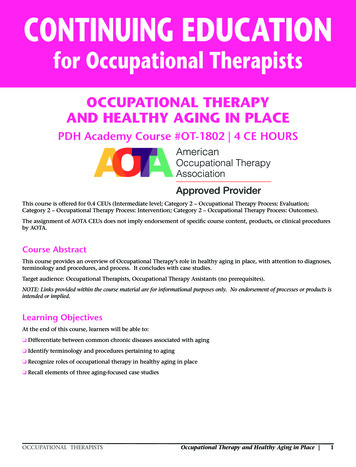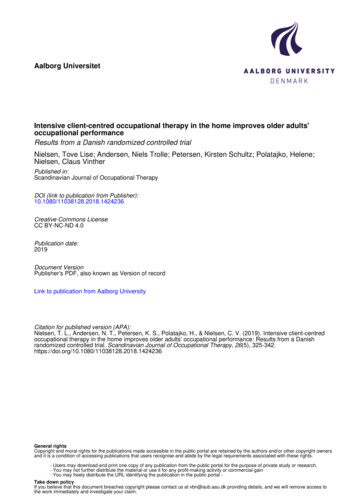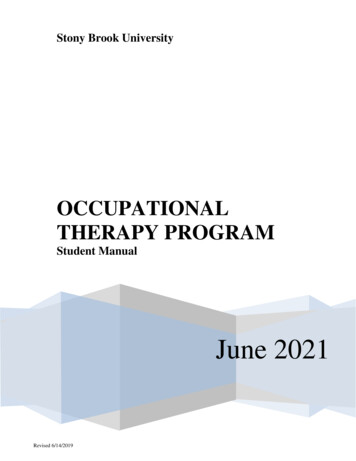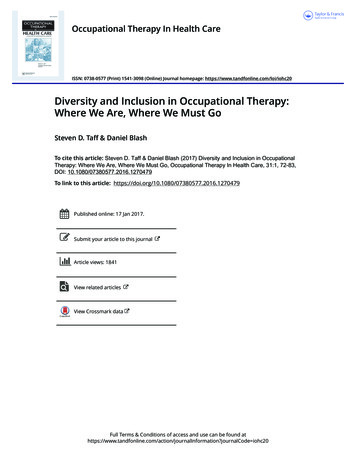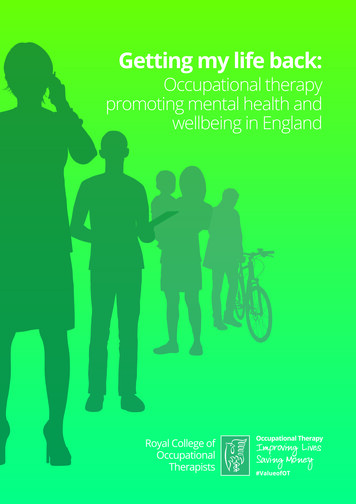
Transcription
Getting my life back:Occupational therapypromoting mental health andwellbeing in England
Published in May 2018by the Royal College of Occupational Therapists106-114 Borough High StreetLondon SE1 1LBwww.rcot.co.ukCopyright Royal College of Occupational TherapistsAll rights reserved, including translation. No part of this publication may be reproduced, stored in a retrieval system ortransmitted, by any form or any means, electronic, mechanical, photocopying, recording, scanning or otherwise withoutthe prior permission in writing of the Royal College of Occupational Therapists, unless otherwise agreed or indicated.Copying is not permitted except for personal and internal use, to the extent permitted by national copyright law, orunder the terms of a licence issued by the relevant national reproduction rights organisation (such as the CopyrightLicensing Agency in the UK). Requests for permission for other kinds of copying, such as copying for generaldistribution, for advertising or promotional purposes, for creating new collective works, or for resale, should beaddressed to the Publications Manager at the above address.
ContentsForeword4–5Executive summary6Recommendation for change71 Ensuring young people with mental health problemsachieve their full educational potential8–92 Addressing the employment needs of people withmental health problems10–113 Improving the physical health of people with seriousmental health problems12–134 Improving access to mental health support inprimary care14–15In conclusionReferencesOccupational TherapyImproving Lives, Saving Money#ValueofOT1617–18
ForewordWe can no longer ignorepeople’s mental health.Around one in sixpeople in England reportexperiencing a commonmental health problemeach week.1 Figuresreported by the WorldHealth Organisation tellus that depression isone of the largest causesof disability worldwide.2These latest reports in the Royal College ofOccupational Therapists’ Improving Lives, SavingMoney series, are focused on mental health. Ourinvestigations highlight, once again, the invaluablecontribution occupational therapists make; in thisinstance by supporting wellbeing, reducing costs andpreventing the escalation of mental health issues.The recommendations in this report offer awide range of opportunities for commissionersand managers to benefit from the value thatoccupational therapy brings to mental healthservices. A third of the 37,000 strong occupationaltherapy workforce work in NHS mental healthservices, and occupational therapy has beenidentified as one of the five key professions formental health.Mental health issues can be barriers to education,development and career opportunities which maylead to longer-term health and wellbeing problems.This report shows how occupational therapists canhelp ensure that every opportunity is grasped andevery aspiration is achieved by supporting individualambitions and goals for young people making thetransition into adulthood.Only 43% of people with mental health issues arein regular employment, compared with 74% ofthe general population.3 Employment is not justabout earning a wage; but also self-esteem, socialinteractions and having a meaningful role in thecommunity. Furthermore, unemployment can leadto a range of other health problems. A key functionof occupational therapy is to support individualswith work. Occupational therapists should be at4the front line of vocational and job seeker serviceswithin communities, to get people back to work andsupport local economies.The link between severe mental ill-health andpoor physical health is one of the greatest healthinequalities in England. Poor diet, smoking, excessalcohol consumption and lack of self-care canlead to serious physical conditions such as heartdisease and diabetes. This report demonstrateshow occupational therapy supports individuals withsevere mental health issues by engaging them withhealthy occupations, such as sport.It is time now to rethink mental health services,innovate the services provided, and really focuson the social determinants of health. Figures fromthe Education Policy Institute show that youngpeople are waiting, on average, over 80 days to starttreatment in mental health services.4 This simply isn’tgood enough. Early intervention is vital in providingeffective support for people with mental healthproblems. Occupational therapists are leading ininnovative mental health service design to reducethe pressure on primary care and ensure timelyinterventions. This can be achieved via partnershipssuch as with third sector organisations. Theseinterventions are preventing people’s mental healthproblems from escalating and therefore reducingthe reliance on more costly and intensive support.We must value physical and mental health equally.Parity of esteem in terms of support available tothose with mental health problems is lagging behindphysical health. We owe it to our communities topush the boundaries in mental health interventionto achieve better services and better outcomes forour citizens. I hope those who read this report willsee the value that occupational therapy can bringand will be open to talking, and listening, to us whendesigning the mental health services of the future.We’re ready – are you?Julia Scott, Chief Executive OfficerRoyal College of Occupational TherapistsGetting my life backOccupational therapy promoting mental health and wellbeing in England – Royal College of Occupational Therapists
Stakeholder commentsRt Hon Norman Lamb, MP and Former Health Minister“Occupational therapists have an essential role to play in supporting people with mental ill health –helping them to engage in work and study and empowering them to lead active and fulfilling lives.However, more needs to be done to fully unlock these benefits and ensure that occupational therapy isat the forefront of holistic mental and physical health care. This important report underlines the need foroccupational therapy to be effectively incorporated into mental health services, which should be treatedas a priority by government and the NHS. As well as the enormous benefits to people’s quality of life, weknow that this also makes economic sense by reducing pressure on other parts of the health service.”Luciana Berger MP, President of the Labour Campaign for Mental Health“Mental ill health presents itself in many guises and what this report draws out is the effectiveness ofoccupational therapy in addressing the variety of problems people of all ages can face. The examplesin this report show the additional value of occupational therapists working in new areas - with studentsand young people transitioning into the world of work, and helping people find and stay in work; gettinginvolved in people’s care at an early stage of their illness; and providing solutions and support to enablepeople to get on with their lives.“The more individuals we can reach earlier, the better for them, their families, their friends and theircolleagues and employers, and the recommendations in this report show how by using occupationaltherapists innovatively, this can be achieved.”Sir Michael Marmot, Director, Institute of Health Equity“Education, employment, and income are key social determinants that affect mental health. This reportfrom the Royal College of Occupational Therapists focuses on increasing people’s chances to do well ineducation and employment and highlights the importance of creating opportunities to engage in healthybehaviours. To improve the mental health of the nation, these social determinants must be addressedand healthcare delivery should be rebalanced to help achieve this end. The Royal College puts forwardrecommendations to highlight the role of occupational therapists in this important sea change. It is amost welcome report.”Leila Reyburn, Policy and Campaigns Manager, Mind“Mental health isn’t just about drugs and talking therapies – services that support people with otheraspects of their lives that may be affected by their mental health are also crucial. We welcome this reportand, in particular, the examples that show clearly how intervening early to get someone the right help canreduce the need for more complex support further down the line. Occupational therapists play a key rolein mental health services, supporting people to live independent lives.”Sarah Brennan OBE, Chief Executive, Young Minds“This report draws attention to the importance of having multi-disciplinary teams helping children andyoung people in addressing mental health problems. Occupational therapists can play an important rolein both preventing the escalation of problems and in helping us learn about ourselves and how we canmanage life, and mental health issues much better, so we can achieve our goals and enjoy life.”Getting my life backOccupational therapy promoting mental health and wellbeing in England – Royal College of Occupational Therapists5
Executive summaryThe case for changeWhy occupational therapy?NHS England report that ‘One in four adults experiences Occupational therapists focus on helping peopleat least one diagnosable mental health problem in anyachieve their life ambitions and chosen occupations,given year. People in all walks of life can be affectedsuch as looking after a home, having a good educationand at any point in their lives, including new mothers,and good employment. Occupational therapistschildren, teenagers, adults and older people. Mentalcan work with people in a more streamlined wayhealth problems represent the largest single cause ofbecause they are uniquely trained to address bothdisability in the UK. The cost to the economy is estimatedmental health and physical health at the sameat 105 billion a year – roughly the cost of the entiretime. They work across all ages and at all stages of a5NHS’.person’s mental health recovery. It is recognised, forexample, that inpatient units with higher occupationalIn recent years there has been an undoubted shift intherapy input have the shortest lengths of stay by upthe perception and understanding of mental ill health, to 20%.8yet people still struggle to access mental healthsupport in the UK. Only 25% of those estimated toOccupational therapists are already establishedneed mental health services have access to them.6in many statutory mental health services and arerecognised as key members of the multidisciplinaryEarly access to the right support when people firstteam. In addition, as demonstrated by the examplesask for help will lessen the impact of mental healthin this report, occupational therapists are movingproblems, by focusing interventions on outcomesout of traditional services and offering occupationalthat really matter to them. Building mental healththerapy in new, innovative and cost-effective ways,support around the individual’s hopes and aspirations such as in universities and football clubs. Initiativesis vital. Whether it is by reducing anxiety to enablesuch as these can reduce mental health stigma andwork or study, or helping recovery from depression,give people speedier access to services.occupational therapy has a pivotal role in combatingmental ill health in England. Doing well at school,This report also includes an example of occupationalbeing happy at work and enjoying life are essentialtherapists leading new models of service in primaryto good mental health and central to occupationalcare, which relieve pressure on statutory services andtherapy.make better use of the third sector provision. Workingin different ways offers a less stigmatising and quickerMany mental health services and teams include andservice.rely on the valuable contribution of occupationaltherapists. As a significant part of the workforce,The Royal College welcomes current nationaloccupational therapists are committed to movingambitions to improve mental health services andaway from traditional models of medicalisedachieve parity of esteem between mental and physicalpractice to one which focuses more on the everydayhealth. This requires an understanding of whereoccupational concerns of people and their families.services are working well and identification of howThese concerns are frequently about the mostbest to target resources.important determinants of health and life expectancy,such as education, employment and social support.As such the Royal College undertook a year-longprogramme of investigation to meet with serviceIn this report, the Royal College argues that earlyproviders, collect data and to understand the impactaccess to occupational therapy for people with mental that the right support has for people with mentalill health will ensure that they have the best longhealth problems. Common themes emerged whichterm health and social care outcomes. It will improvehighlighted the importance of accessing occupationallongevity and quality of life; enabling people to gettherapy at key transition points in life, and led to theback in control of their lives. Occupational therapistsfour key actions for service change outlined in thisimprove access to services, integrate mental andreport.physical health and promote good mental health. Theexamples in this report not only support but driveNHS England’s vision of The Five Year Forward View forMental Health.76Getting my life backOccupational therapy promoting mental health and wellbeing in England – Royal College of Occupational Therapists
Recommendation for changeRecommendation for changeThe Royal College of Occupational Therapists recommends thatoccupational therapists lead and innovate in the design anddelivery of mental health services in four key areas:3health problems.Improving the physical health of people with serious mental healthproblems, incorporating and promoting healthy occupations.Improving access to mental health support in primary care.LTEA HYH4Addressing employment needs when working with people with mentalOCCS2adulthood by helping them achieve their full educational potential.ON1Ensuring young people with mental health problems transition well intoU P A TIActivities thatpromote good9health and wellbeingOCPHCEUAHIOYNTL AT SGetting my life backOccupational therapy promoting mental health and wellbeing in England – Royal College of Occupational Therapists7
1Ensuring young people with mental healthproblems achieve their full educational potentialOccupational therapists should bedeployed to support young peoplewith mental health problemstransition well into adulthood byhelping them achieve their fulleducational potential.RationaleEvidence from the House of Commons states that:‘Young adults aged 16-24 today are more likely thanprevious generations of young adults to experiencemental health issues and the numbers of studentsreporting mental ill health is increasing The impactof mental health issues can be serious and accordingto the Higher Education Statistics Authority (HESA)there has been a 210% increase of students leavinguniversity due to mental health problems over thelast five years.’ 10In 2017, the Institute for Public Policy Researchpublished a set of recommendations to supportstudents with mental health problems.11 Theserecommendations include having effective andwell-resourced systems in place to supportstudents’ progress throughout their course.Employing occupational therapists to supportyoung people with their learning opportunities willensure that providers are better placed to fulfiltheir duties in line with the Equality Act,12 includingmaking reasonable adjustments. If young people’smental health problems are better addressed atthis stage, they are more likely to complete theircourses, apprenticeships and internships. This isof benefit to both the provider and the student.Occupational therapists are already workingin some student support services at HigherEducation Institutions in England. As mentalhealth advisers, occupational therapists makeassessments as to how people’s ability to learn isaffected by their mental health problems. Theywork with students to develop strategies, enablingthem to complete their courses/placements8and fulfil their student role. They also provideadvice and guidance to tutors so they, in turn,can support students. In addition, occupationaltherapists contribute to promoting a widerunderstanding of mental health and wellbeing tothe education provider. Occupational therapists’non-medical approach means they can tackle awide range of issues and focus on the students’education to enable them to get their lives backon track.Sarah’s story:Sarah was in her second year of a BA Honsmusic degree at Leeds College of Music whenshe contacted the Student Health and WellbeingService. She had been experiencing an increasein stress, anxiety and obsessive compulsivebehaviours due to a recent diagnosis of chronicfatigue syndrome (CFS). Following occupationaltherapy assessment it was clear that Sarahwas struggling with self-care, was behind inher academic work, felt unable to relax andoverwhelmed by her problems.The occupational therapist worked with Sarah to: improve her daily routines advise on coping skills to manage her CFSand stress encourage use of university wellbeinginitiatives; and teach assertiveness skills.As a result of the occupational therapyintervention, Sarah reported feeling more incontrol of her own mental and physical health.She felt more able to manage her interpersonalrelationships which positively impacted upon herstress levels and feeling of empowerment. Sarahalso acknowledged that by better managing heractivities of daily living, and having a structureddaily routine, she was able to avoid ‘burn out’and spot the early warning signs of mentalor physical ill health. Achieving a degree hasincreased Sarah’s opportunities and prospectsfor her future working life.Getting my life backOccupational therapy promoting mental health and wellbeing in England – Royal College of Occupational Therapists
The cost of the occupational therapist’sintervention in Sarah’s case was approximately 252 for six hour long sessions. For thisinvestment the university avoided a loss ofincome of up 75% of the tuition fee for thatacademic year and any subsequent years thatSarah remains registered on her course.interviewing, coping strategies, psychoeducation and encouraging occupationalengagement. These interventions encourageautonomy and are targeted at a student groupthat has a strong commitment to musicalpractice/performance, alongside academic workand financial constraints.Outcomes:I genuinely feel that I would nothave been able to get throughmy degree without the support thatyour team has offered me. I am sovery grateful.Service example 1:Student Health and Wellbeing Team, LeedsCollege of MusicThe service was set up in September 2016 toaddress any aspect of a student’s mental healthor wellbeing. In one academic year the servicehas seen around 30% of the student population.Led by an occupational therapist, the teamalso consists of two counsellors, two wellbeingadvisers and an international wellbeing adviser.The majority of students accessing the serviceare aged between 18–25 on higher educationdegree courses in music. The majority of thestudents have attended mainstream educationsettings; a small number of these havepreviously had access to mental health services.Students have a range of emotional and mentalhealth issues such as mood and personalitydisorders, psychosis and anxiety disorders. Theservice works closely with the Disability SupportTeam to organise reasonable adjustmentsand liaise with other specialist mental healthservices.The main remit of the service is to impactpositively upon a student’s ability to engagewith their studies and student experience byaddressing any mental health and wellbeingissues. The occupational therapist exploreshow the environment impacts on the student’sability and motivation to plan and organise theirday to day occupations. Examples of specificinterventions include activity scheduling, goalsetting, behavioural activation, motivational Students report a link between improvementsin their mental health and wellbeing, betterattendance at lectures and seminars, increasedsubmission of academic work and someimprovement in grades. Students also report feeling more hopefulabout the future and make positive changesin lifestyle choices, such as healthy eating andexercise. Students who use the service are less likely torequire ongoing input from GPs and other NHSmental health services.As occupational therapists workcollaboratively with their clientgroup, we are able to empower studentsto manage their own wellbeing andlearn mental resilience through the useof meaningful, purposeful occupation.Clare Copley (Occupational Therapist)Student Health and Wellbeing ManagerKey components for delivering therecommendation: Locally agreed referral processesallowing sixth form schools andHigher Education Institutions to accessoccupational therapy for students. Occupational therapists shouldbe employed within occupationalhealth or student services at HigherEducation Institutions. Provision of a range of resourcesfor students promoting healthyoccupations to support wellbeing.Getting my life backOccupational therapy promoting mental health and wellbeing in England – Royal College of Occupational Therapists9
2Addressing the employment needs of peoplewith mental health problemsOccupational therapists should bedeployed to address employmentneeds when working with people withmental health problems.RationaleNHS England states that ‘The employment ratefor adults with mental health problems remainsunacceptably low: 43 per cent of all people withmental health problems are in employment,compared to 74 per cent of the general populationand 65 per cent of people with other healthconditions. Of people with ‘mental and behaviouraldisorders’ supported by the Work Programme,only 9.5 per cent have been supported intoemployment, a lower proportion than for someproven programmes. There is a 65 per cent pointgap between the employment rates of people beingsupported by specialist mental health services whohave more severe health problems and the generalpopulation’.13The importance of employment cannot beoverestimated; it gives a person access to anincome, social contact and a role. For most adultswork and employment is a significant part oftheir life and identity. It gives people a sense ofpurpose, focus and the feeling of belonging tosociety. Significantly, along with other healthdeterminants, there is a link between employmentand life expectancy. In addition, Public Health10England reports that ‘children growing up inworkless families are more likely to fail at every stageof educational testing.’14Unemployment also has wider societalimplications; for those who claim Employmentand Support Allowance, mental illness is themost frequently reported health problem.15 TheFive Year Forward View for Mental Health statesthat ‘the NHS must play a greater role in supportingpeople to find or keep a job’.16 To meet this aim,occupational therapists must be deployed toaddress the employment needs of the people theywork with. If people with mental health problemsare supported to achieve their employmentaspirations, it improves their health and thewellbeing of their family and has cost benefits tothe overall economy.I got my perfect job within fourmonths that matched my skills,experience and ambition. It has changedmy life.All occupational therapists offering interventionsto working-age adults are in a position to ask the‘work’ question. Supporting people to remainin, return to or obtain work is a key functionof occupational therapy. As occupationaltherapists are trained to assess the person,the demands of the job and the workingenvironment, they are able to identify best-fitsolutions to mental health problems that preventwork. In addition to supporting the employee,occupational therapists work with employers toincrease their understanding of mental healthproblems. Interventions can range from thoseneeding minimal to more intensive specialistservices, supported employment or vocationalrehabilitation.17Occupational therapy-led return towork services can improve employmentoutcomes and address an unmet needthat perpetuates health inequalitiesGetting my life backOccupational therapy promoting mental health and wellbeing in England – Royal College of Occupational Therapists
Jason’s story:Jason is a middle-aged man with a long-term history of anxiety and depression. He was referred from theCommunity Mental Health Team to the occupational therapist based in the Kent and Medway VocationalRehabilitation Service. At the point of referral he had been signed off work by his GP for 12 weeks withno date set for his return. There were unresolved issues between Jason and his new line manager whichneeded mediating and there were no plans in place to support his return to work.The occupational therapist’s intervention at this stage in his recovery was timely and crucial. With theoccupational therapy support, Jason was able to commence a gradual phased return to work withintwo weeks from the point of referral. A Wellness Recovery Action Plan was completed identifyingreasonable adjustment recommendations, including a temporary move to another work location whilethe outstanding issues between Jason and his manager were successfully resolved during a workplacemediation session. The occupational therapist provided resources for the manager on how to successfullymanage and support an employee with mental health problems in the workplace. Weekly check-ins werealso arranged for Jason via a Workplace Buddy.Since his return to work, Jason has had no need for further meetings with his care coordinator, therebyreducing the workload of the Community Mental Health Team. Jason was transferred to primary care as aresult of the occupational therapy interventions.Cost savings in this example were achieved by moving Jason from specialist mental health services backto primary care. The average cost of one hour’s contact with the CMHT is 190 compared to a cost of 36for 10 minutes with a GP.18Service example 2:Vocational Rehabilitation Service, Kent andMedway NHS and Social Care Partnership Trust(KMPT)The Vocational Rehabilitation Service isoccupational therapy-led and forms part of thecore community services provided by KMPT. Themultidisciplinary service is designed to meet theemployment needs of people with complex mentalhealth problems and recovery is the fundamentalprinciple underpinning the care.The service offers individuals support in theirpersonal recovery journey to achieve theiremployment goals with hope, optimism andconfidence.The service bases its interventions on the evidencebased Individual Placement and Support (IPS)approach which helps the individual gain and retainpaid employment. The service provides: Comprehensive assessment of employment needsand aspirations. Supported employment interventions, offered aspart of secondary mental health care. Employer liaison and specialist advice. Rapid job retention support to facilitate return towork following sick leave. People are contacted onthe day of referral and seen within 48 hours. Liaison between primary and secondary mentalhealth employment services to enable earlyintervention and efficient, timely transfer of care. Provision of early intervention advice and supportfor people in hospital. A twelve-week Job Taster Programme givingindividuals the opportunity to ‘taste’ work andgain valuable work experience within KMPT as apathway to paid employment.Outcomes:People who have been supported by theVocational Rehabilitation Service to find, return toand retain employment report that: They feel a positive link between employmentand self-worth. There is a reduction in mental health symptoms,including anxiety while reintegrating back into theworkplace. They feel confident that they can manage theirmental health in the work environment withsupport from the service.Employers also report an increase in confidence inmanaging their employees’ mental health needsin the workplace and value the input from theservice.Key components for delivering therecommendation: All occupational therapy posts shouldhave employment as a key responsibilitywithin their job specifications. Occupational therapists should beemployed to lead vocational services. Agreements should be put in placeto support direct working betweenoccupational therapists and the local JobCentre Plus, in particular with DisabilityEmployment Advisers.Getting my life backOccupational therapy promoting mental health and wellbeing in England – Royal College of Occupational Therapists11
3Improving the physical health of people withserious mental health problemsOccupational therapists should beinvolved in plans to improve thephysical health of people with seriousmental health problems, incorporatingand promoting healthy occupations.RationaleNHS England states that ‘Physical and mentalhealth are closely linked – people with severe andprolonged mental illness are at risk of dying onaverage 15 to 20 years earlier than other people –one of the greatest health inequalities in England.Two thirds of these deaths are from avoidablephysical illnesses, including heart disease and cancer,many caused by smoking. There is also a lack ofaccess to physical healthcare for people with mentalhealth problems – less than a third of people withschizophrenia in hospital received the recommendedassessment of cardiovascular risk in the previous 12months’.19There are a range of strategies that can improvethe physical health of those with serious mentalhealth problems, including interventions thattackle diet, smoking, alcohol consumption andencourage exercise. Increasing people’s physicalactivity, for example through the use of sport, isan excellent and cost effective way of extendinglife expectancy. The National Institute for Healthand Care Excellence advocate that ‘people withpsychosis or schizophrenia, especi
occupational therapy brings to mental health services. A third of the 37,000 strong occupational therapy workforce work in NHS mental health services, and occupational therapy has been identified as one of the five key professions for mental health. Mental health issues can be barriers to education, development and career opportunities which may

